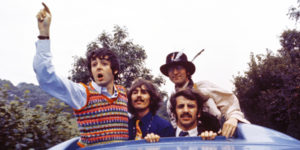Ken Scott began producing and engineering records when he was 18 years old, quickly cementing his place in music history by working with the Beatles and recording three of their legendary albums: A Hard Day’s Night, the White Album and Magical Mystery Tour.
The Beatles are only a fraction of Scott’s discography, with David Bowie, Elton John, Missing Persons, Duran Duran and countless others on the list. Through it all, Scott has had a passion for recording drums, and he is a master at miking and capturing the instrument. As today’s producers, engineers and home-recording musicians increasingly turn toward technology to create their beats, Scott has teamed up with Sonic Reality and released the ultimate in drum software: A Ken Scott Collection — EpiK DrumS, the first in a series. EpiK DrumS features original drummers recreating their distinctive styles and making them available for use “as is,” as well as for applications and a learning tool.
Planet Ill spoke with Ken Scott about EpiK DrumS, the art of recording real drums, and the future of production and technology.
Planet Ill: How did you get involved with Sonic Reality and the EpiK DrumS project?
Ken Scott: I was asked so many times over the years how to get this sound and that sound, and originally there was an easy answer, but time has gone by and the gear that was used then has been thrown to the back and it’s harder to get those sounds without it.
I worked on a sample project [Fab Four Virtual Instrument] a couple of years ago and it was a blast. It seemed a good way to get those sounds to people. I hooked up with Dave Kerzner and Sonic Reality and then five drummers I had worked with in the past: Bill Cobham, Bob Siebenberg, Terry Bozzio, Woody Woodmansey and Rod Morgenstein. I specifically picked them because each had a very distinctive sound and each a totally different style from the others.
I then found the studios that most closely matched the recording environment and that had a Trident A Range desk [New Monkey, Long View Farm and Emblem], then the mics, which wasn’t easy, and of course was very expensive, and finally we rented drum kits as close as possible to the ones originally used. The drummers played along with the tracks we’d done together whilst I matched the sounds, and then we recorded grooves from those albums, and finally told them to let loose.
The result is A Ken Scott Collection – EpiK DrumS, which can either be totally played or programmed by the user, or the grooves can be pieced together. Or even a little of each.
Planet Ill: Is recording real drums becoming a lost craft?
Ken Scott: It’s being lost no matter what because people use samples so much. They’ve gotten used to pushing a button to get the sound. A sound that they may have had to spend hours searching for. I’d rather they have the opportunity to use easily findable classic sounds based around very specific classic albums.
A lot of engineers these days have never recorded live drums. With EpiK DrumS, every mic has its own track and you can change the sounds and learn to mix drums and learn about the problems one often comes across, such as cymbals leaking into the tom mics, without spending hours in the studio and lots of money. It’s an educational tool that hopefully will lead them to want to record real drums, once they have learned about the mixing side of things.
I chose these five drummers because the recordings we worked on together have very specific sounds. I’ve spent way too much time in the studio looking for a particular sampled snare sound I liked. But with this, if someone wants that ’70s Brit glam rock, they’ve got that here. Or the Missing Persons Roto-tom sound, or the Mahavishnu Orchestra jazz fusion sound. It’s not a generic thing. It’s very, very specific to a time, a place and certain classic recordings, but they all stand the test of time and can be used easily in today’s music.
Planet Ill: Does convenience trump quality? Are we gaining effects while losing creativity?
Ken Scott: It comes down to us as humans — what we use and how we want to use it. I remember hearing a wah wah for the first time on the radio, and it was a great sound until four weeks later when every song had one. We always take things to extremes. Why should it be only analog or only digital? Why not use the best of both worlds?
 Whenever possible, I use both. It’s harder these days because not many studios have analog capabilities. I did a film session recently, and the second engineer had never worked with analog tape. Tape has its own smell, old-timers love it, and this engineer opened the bag and said, “I think this tape is bad. It smells.” We all just fell about, because that smell is so much a part of the joy of the whole process.
Whenever possible, I use both. It’s harder these days because not many studios have analog capabilities. I did a film session recently, and the second engineer had never worked with analog tape. Tape has its own smell, old-timers love it, and this engineer opened the bag and said, “I think this tape is bad. It smells.” We all just fell about, because that smell is so much a part of the joy of the whole process.
Planet Ill: With the advent of DAWs and the Internet, will real producers and engineers become obsolete?
Ken Scott: No. In my humble opinion, talent will win out. It’s so hard in the marketplace these days because everyone’s dealing with major record companies who want instant success. They’re not building careers. That makes it harder for artists, producers and engineers to learn their craft. It’s “What did you do last week? You weren’t on the Billboard 100? Then you’re not getting a gig.” But there are great producers out there. Hell, I’d love to do more, but I don’t know a single A&R man these days and they don’t know me. I wasn’t in the Billboard 100 last week.
I used to never like talking about my past. It was always the next project, the next project. A few years ago, my past bit me in my rear end. I was doing a session at Abbey Road and a maintenance engineer who had begun working there the same time as I did had asked if he could work that particular day just so we could have a chat. He asked if I remembered the old engineers that regaled us with stories of what it was like at the start of the recording industry, and he said, “Now, we are those people. Those old timers.”
I realized then that we had lost a generation. No one recorded them; there were no videos, no books about them. We can’t let people forget that there was so much good back then, along with some bad, but the good is being forgotten. We can’t let people forget what they are fast losing. Then I got a call from George Harrison. He was reworking All Things Must Pass and asked if I would like to work with him. We were at the mixing console at his house outside of London, 30 years later, listening to the same multi-tracks, working on the exact same thing, and we looked at each other and burst out laughing.
Back then, artists put out an album every six months, and if people were still talking about it when the next one came out, we had done our jobs. But 30 years later? We had absolutely no idea! Then I did the 5.1 surround of Ziggy Stardust, and all of a sudden my past — light bulbs went on over my head and I thought, “My past does mean something and I need to talk about it.” So I started doing audiovisual presentations and workshops, and now there’s A Ken Scott Collection – EpiK DrumS.
Stardust, and all of a sudden my past — light bulbs went on over my head and I thought, “My past does mean something and I need to talk about it.” So I started doing audiovisual presentations and workshops, and now there’s A Ken Scott Collection – EpiK DrumS.
Planet Ill: Do you still use tape? Is this also going to be a lost art and/or its availability obsolete?
Ken Scott: I still use it as much as possible. What scares me more are the technicians working on analog machines. There was an art to keeping them running at their best. Those technicians are disappearing, and soon no one will know how to get the best out of the analog machines. That’s a bigger problem to me than the availability of tape.
Planet Ill: Technology: what’s good and what’s bad?
Ken Scott: The good is that anything is possible. The bad is that anything is possible! I was blessed to come to this, to my trade, at a time when technology and art were starting to come together; it was the beginning of their intermingling. We were discovering the technology as we went along. We had to start with a good sound and use the limited amount of effects to improve on it. We never tried to make a bad sound sound good.
For more information about EpiK DrumS, visit www.sonicreality.com/index.php/akenscottcollection-epikdrums.
To learn more about Ken Scott, visit www.komosproductions.com.
Elianne Halbersberg is a freelance writer whose work has also appeared in Mix, Premier Guitar, Electronic Musician, Audio Media, Ink 19 and many other magazines and websites.
Follow Us on Twitter @ http://twitter.com/planetill
Join Us on the Planet Ill Facebook Group for more discussion
Check out Planet Ill’s page on Essence.com
Follow us on Networked Blogs






I liked the article